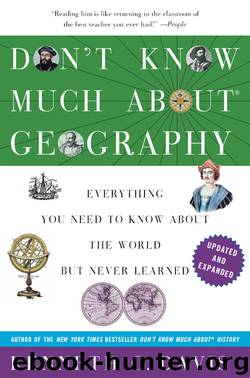Don't Know Much About Geography by Kenneth C. Davis

Author:Kenneth C. Davis
Language: eng
Format: epub, pdf, mobi
Publisher: HarperCollins
Published: 2013-03-10T16:00:00+00:00
Where Was the World’s First City?
With the recent discoveries of skeletal remains in caves in the Middle East by a joint Israeli-French archeological team, the dates of the earliest “modern” humans have been pushed back to approximately 100,000 years ago. Nomadic hunter-gatherers, these folks would take some time to settle down. About 90,000 years, give or take a few centuries.
The first permanent human settlements were made in the Middle East, with the establishment of sedentary bases with houses, storage facilities, and tools that have been found in modern-day Israel. Remains from this very ancient human era were first found in the Wadi en-Natuf area in modern Israel near the shores of the Mediterranean, and the period has been called Natufian. Permanent settlements next grew in what is now Syria, the Euphrates area (modern Iraq), Persia (modern Iran), and Anatolia (modern Turkey), as hunter-gatherers traded in their flint spears for plowshares and learned how to farm about 10,000 years ago. Çatal Hüyük, located in southern Turkey, was a town of some 6,000 people occupied from about 7000 BC, where some of the oldest known pottery, textiles, and plastered walls have been discovered.
While these agricultural settlements represented a great leap toward civilization, the first true cities were the ancient capitals of the early civilizations, such as Ur of the Chaldees in Mesopotamia, which was founded approximately 4000–3500 BC. The capital of the Sumer kingdom, birthplace of writing and the presumed home of the biblical patriarch Abraham, Ur was once a great city featuring one of the ziggurats, or brick pyramid temples, built in the Mesopotamian region starting around 3000 BC. (One of these ancient pyramids is presumably the basis for the biblical Tower of Babel.) An early trading center, the city was later abandoned when the Euphrates changed its course. At that point, around 2000 BC, Babylon became the capital of the Old Babylonian empire and quickly became the greatest city of the period, featuring the famed Hanging Gardens (see later in this chapter, “What Were the Seven Wonders of Antiquity?”).
Thebes and Memphis, at various times the capital cities of ancient Egypt, were probably founded around the same time as Ur. And in the Indus Valley (modern-day Pakistan), Harappa and Mohenjo-Daro (Hindu for “mound of the dead”) were sophisticated cities of some 40,000 people that date from about 2500 BC and which traded with Ur. By contrast, the first circular earthen mounds dug at the Stonehenge site in Great Britain date to about 2750 BC, with the stone megaliths apparently put in place by 1700 BC. Such great cities as Cairo (founded as El Fustat in AD 642) and Baghdad (founded about AD 762) are relative newcomers.
The title of the oldest, continuously inhabited city belongs to the Syrian capital of Damascus, the oldest capital city in the world. Built in an oasis and dating to about 2000 BC, Damascus was an early commercial center as a halt for the desert trading caravans. It is mentioned in the book of Genesis in connection with Abraham, the patriarch revered by Jews and in the Islamic world as well.
Download
Don't Know Much About Geography by Kenneth C. Davis.pdf
Don't Know Much About Geography by Kenneth C. Davis.mobi
This site does not store any files on its server. We only index and link to content provided by other sites. Please contact the content providers to delete copyright contents if any and email us, we'll remove relevant links or contents immediately.
Man-made Catastrophes and Risk Information Concealment by Dmitry Chernov & Didier Sornette(6007)
The Revenge of Geography: What the Map Tells Us About Coming Conflicts and the Battle Against Fate by Kaplan Robert D(4069)
Zero Waste Home by Bea Johnson(3833)
COSMOS by Carl Sagan(3618)
Good by S. Walden(3548)
In a Sunburned Country by Bill Bryson(3537)
The Fate of Rome: Climate, Disease, and the End of an Empire (The Princeton History of the Ancient World) by Kyle Harper(3055)
A Wilder Time by William E. Glassley(2858)
Camino Island by John Grisham(2794)
Organic Mushroom Farming and Mycoremediation by Tradd Cotter(2689)
The Ogre by Doug Scott(2679)
Human Dynamics Research in Smart and Connected Communities by Shih-Lung Shaw & Daniel Sui(2500)
Energy Myths and Realities by Vaclav Smil(2487)
The Traveler's Gift by Andy Andrews(2457)
9781803241661-PYTHON FOR ARCGIS PRO by Unknown(2365)
Inside the Middle East by Avi Melamed(2352)
Birds of New Guinea by Pratt Thane K.; Beehler Bruce M.; Anderton John C(2252)
A History of Warfare by John Keegan(2240)
And the Band Played On by Randy Shilts(2199)
